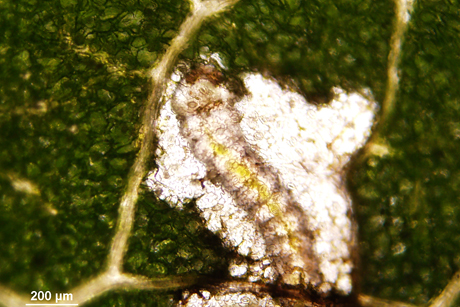Plant eaters, and the flora they eat, give peace a chance
By Krishna Ramanujan

Plants are often described as being in an evolutionary arms race with the creatures that eat them. Plant eaters develop new strategies for attacking, and plants acquire new ways to defend themselves.
But sometimes, non-conflict may be the best strategy for both plant eaters and plants, according to a new Cornell study that uses ideas from economics and game theory in a computer model. The research was published online June 20 in the American Naturalist.
“The model shows that both the herbivore and the plant develop strategies that optimize their benefits,” said Candace Low, the paper’s lead author and a visiting research scientist in the lab of co-author Stephen Ellner, professor of ecology and evolutionary biology.
“For example, if you have a T-shirt that I want, you may be able to give it up to me when you are done with it,” said Low. “But if I want it when you want it, then we are going to fight for it, and that will be more costly for both of us.”
Take the tupelo leafminer moth (Antipila nysaefoliella), for example, whose eggs are dormant through summer until August when they hatch, and the larvae eat tupelo tree leaves (Nyssa sylvatica). By late summer, the intrinsic value of the leaf has diminished because the growing season is winding down, the leaf’s lifespan is almost over and the shrinking daylight results in less photosynthesis. Since each leaf’s value has become relatively low, the plant benefits by conserving its resources and tolerating more herbivory. It therefore raises its threshold for turning on its chemical defense system, which is triggered when leaves are eaten.
Low, who studies the moth’s biology, has been observing the moths and trees for years in northern Virginia. She has applied the natural history data to create a more biologically realistic model, and under almost every scenario, the model showed that the best outcome for both the moth larvae and the tree was to allow feeding late in summer when the leaf’s value diminishes.
“For the herbivore, it’s not optimal to feed on the leaves when the plant’s defenses are highest,” said Low. “The herbivore often gets a better payoff from feeding when the leaf is undefended.” As long as the plant has the capability for moderately lethal defense, the herbivore will modify its hatching rate to avoid plant defense, and the plant will never have to use those defenses, the paper states.
The findings question a basic ecological assumption that the plant-herbivore relationship is based on conflict, Low said.
“Our results show that plant and herbivore arrive at a conclusion that is ecologically neutral, when the plant doesn’t care if it is fed on,” she added.
Matthew Holden, a graduate student in the field of applied mathematics, is a co-author of the study.
The National Science Foundation Biological Informatics Postdoctoral Fellowship funded the research.
Media Contact
Get Cornell news delivered right to your inbox.
Subscribe